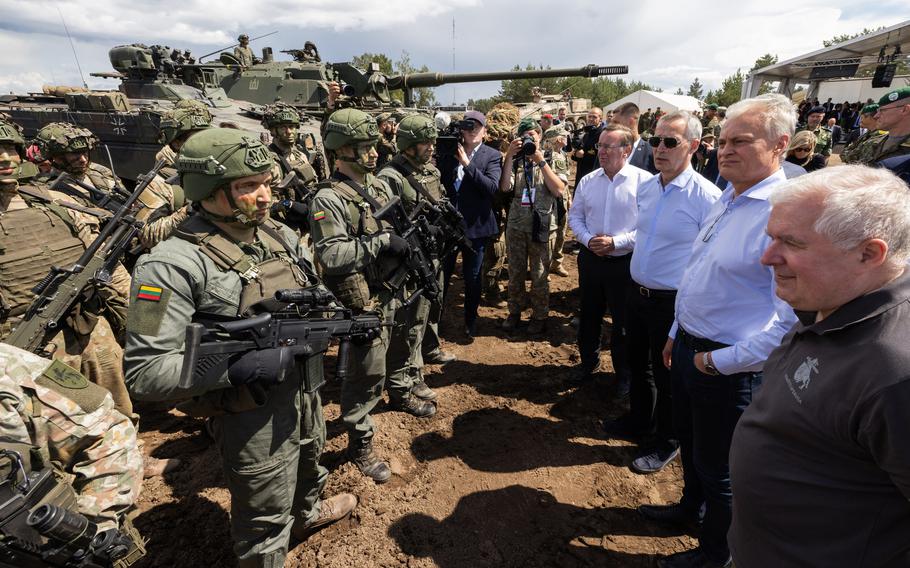
Defense Minister of Lithuania Arvydas Anusauskas, Lithuania President Gitanas Nauseda, NATO Secretary-General Jens Stoltenberg, and German Defense Minister Boris Pistorius, from right, talk to soldiers taking part in Exercise Griffin Storm in Lithuania, June 26, 2023. (NATO)
A brief mutiny in Russia over the weekend exposed the fragility of President Vladimir Putin’s government, NATO’s top official said Monday during a stop in Lithuania, where he also heralded a new pledge by Germany to base several thousand infantry troops permanently in the Baltic state.
Secretary-General Jens Stoltenberg said Berlin’s decision to station an army brigade in Lithuania will enhance allied security along the eastern flank.
“This demonstrates German leadership, German commitment to our trans-Atlantic bond,” said Stoltenberg, who was in Lithuania to observe military drills.
German Defense Minister Boris Pistorius, speaking alongside Stoltenberg, said the Baltic countries of Lithuania, Latvia and Estonia are “very much exposed” because of their geographic proximity to Russia. For that reason, Berlin is willing to take on greater security responsibilities given Germany’s status as Europe’s largest economy, he said.
“Germany is ready to deploy a robust brigade in Lithuania on a permanent basis,” he said.
A timeline was not announced for the establishment of a brigade of 4,000 troops, which Pistorius said was contingent on Lithuania’s construction of the required infrastructure.
The move would expand and make permanent a smaller rotational force that has been operating in Lithuania for the past several years.
The United States also regularly trains in the region and earlier this month took a lead role in the multinational BALTOPS sea exercise.
Allies should remain vigilant even after the internal dispute between Yevgeny Prigozhin, the leader of the private army known as the Wagner Group, and the Russian military, Stoltenberg said.
The mutiny “demonstrates how difficult and dangerous this is for President Putin to be reliant on mercenaries that have actually turned against him,” Stoltenberg said. “And it also demonstrates that it is hard to predict exactly what will now happen in the next days and weeks.”
Much remains unclear about what the future will hold for Wagner Group fighters and Prigozhin, who reportedly is headed to Belarus after ordering his troops to stand down on their march Saturday toward Moscow.
They had invaded Rostov-on-Don, the headquarters of Russia’s Southern Military District, and seized key infrastructure in the city of 1.1 million people.
The group has played a major role in the war in Ukraine and remains armed. Its fighters could be absorbed by the Russian army.
But despite the turmoil, it would be a mistake to underestimate the Russians, Stoltenberg said, adding the West must remain focused on providing military support to Ukraine’s war effort for the long term.
“The events over the weekend are an internal Russian matter and one more demonstration of the big strategic mistake that President Putin has made with his illegal war against Ukraine,” he said.
Meanwhile, Russian media reported Monday a criminal case against Prigozhin for organizing an armed mutiny remains open.